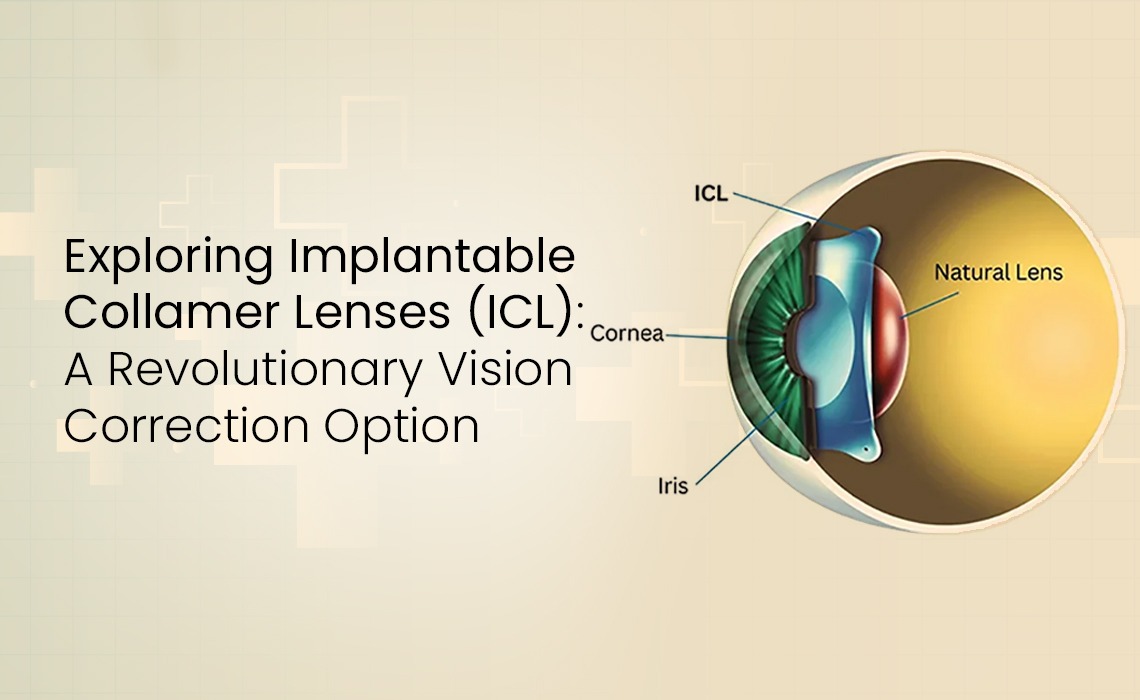In the field of vision correction, Implantable Collamer Lenses (ICL) are emerging as an innovative and effective solution for individuals seeking clear, sharp vision without glasses or contact lenses. Unlike traditional LASIK surgery, ICL does not reshape the cornea. Instead, it involves placing a lens inside the eye, offering a reversible and less invasive approach to correcting vision issues like nearsightedness, farsightedness, and astigmatism. Here’s everything you need to know about ICL, its benefits, and how it works.
What is ICL?
Implantable Collamer Lenses (ICL) are ultra-thin, flexible lenses that are surgically placed inside the eye, specifically between the iris and the natural lens. The procedure is particularly beneficial for individuals who may not be ideal candidates for LASIK due to thin corneas, severe prescriptions, or other concerns. Made from a biocompatible material called Collamer, these lenses work in harmony with your eye’s natural chemistry, offering a clear, high-definition vision with less risk of side effects.

How Does ICL Work?
The ICL procedure is relatively quick and minimally invasive. Here’s a brief overview of how it works:
1.Pre-surgery Evaluation: Your eye care provider will conduct a comprehensive eye exam to determine if you’re a suitable candidate for ICL. This involves measuring the thickness of your cornea, checking your prescription, and assessing overall eye health.
2.Lens Insertion: During the procedure, a tiny incision is made in the eye. The ICL is folded and inserted through this incision and then carefully positioned behind the iris.
3.Positioning and Adjustment: Once in place, the lens unfolds and naturally fits within the eye. Your surgeon may make small adjustments to ensure optimal placement.
4.Post-operative Care: The recovery time for ICL is relatively short, and many patients experience improved vision within a few hours after the procedure. Regular follow-up appointments are essential to monitor healing and eye health.
Benefits of ICL
ICL offers a range of benefits that make it an attractive option for those seeking vision correction:
•Enhanced Visual Clarity: ICLs provide sharp, clear, high-definition vision that often surpasses what glasses or contact lenses can offer.
•Biocompatibility: The Collamer material is naturally compatible with the eye, minimizing risks of infection and complications.
•Reversible: Unlike LASIK, ICL can be removed or replaced if needed, making it a flexible and reversible vision correction option.
•Suitable for High Prescriptions: ICL is highly effective for individuals with severe nearsightedness or astigmatism who may not be candidates for other procedures.
•Short Recovery Time: Most patients can resume regular activities within a day or two, and they often report minimal discomfort.
•UV Protection: Collamer lenses block harmful UV rays, offering added protection to your eyes.
Who is a Candidate for ICL?
ICL is ideal for individuals who:
•Are aged 21 to 45 with stable vision for at least a year
•Have moderate to high levels of nearsightedness or astigmatism
•Are not ideal candidates for LASIK due to thin corneas or high prescriptions
•Seek a reversible vision correction option
•Desire freedom from glasses or contact lenses
However, ICL may not be suitable for individuals with certain eye conditions, such as shallow angles, certain corneal diseases, or glaucoma.
ICL vs. LASIK: Which is Right for You?
Both ICL and LASIK are effective for vision correction, but they suit different needs:
•ICL is preferable for those with thin corneas, high prescriptions, or who seek a reversible procedure.
•LASIK is a permanent, corneal reshaping surgery and may be more suitable for mild to moderate vision correction needs.
An eye care professional can help you weigh the pros and cons of each option based on your unique vision requirements.
Preparing for ICL Surgery
If you’re considering ICL, here are some steps to prepare:
1.Comprehensive Eye Exam: Your eye care provider will perform an in-depth examination to determine if ICL is right for you.
2.Follow Pre-operative Instructions: You may be asked to stop wearing contact lenses a week before the surgery to ensure accurate measurements.
3.Arrange for Transportation: Since your vision may be slightly blurry immediately after surgery, arrange for a friend or family member to drive you home.
4.Understand the Recovery Process: Recovery is usually quick, but follow all post-operative instructions to ensure optimal healing.
Post-Procedure Care
After ICL surgery, follow these tips for a smooth recovery:
•Avoid Touching Your Eyes: For the first few days, avoid rubbing or touching your eyes.
•Attend Follow-up Appointments: Regular check-ups are crucial to monitor healing and eye health.
•Follow Medication Guidelines: Use prescribed eye drops as directed to prevent infection and reduce inflammation.
•Protect Your Eyes: Wear sunglasses outdoors to shield your eyes from UV rays and bright light.
Conclusion
ICL is a groundbreaking solution in vision correction, offering a safe, effective, and reversible way to achieve clear, lasting vision. By working in harmony with the eye’s natural structure, ICL delivers high-quality vision without reshaping the cornea, making it an ideal option for many individuals. If you’re considering vision correction and are looking for an alternative to LASIK, talk to an eye care professional to explore if ICL is the right choice for you.
Discover clear vision and a new perspective with ICL!








